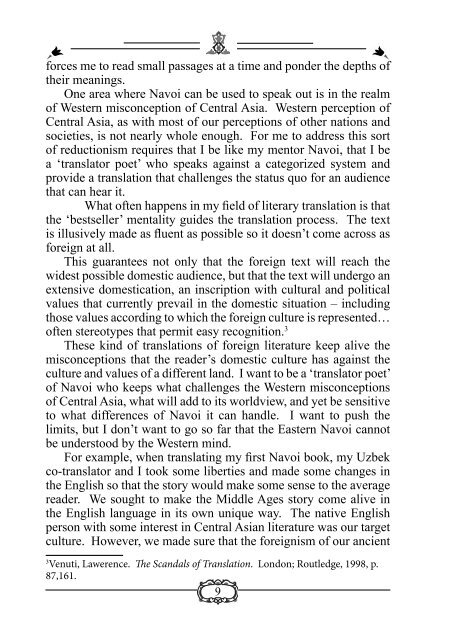Untitled - Azam Abidov - poet and translator
Untitled - Azam Abidov - poet and translator
Untitled - Azam Abidov - poet and translator
Create successful ePaper yourself
Turn your PDF publications into a flip-book with our unique Google optimized e-Paper software.
forces me to read small passages at a time <strong>and</strong> ponder the depths of<br />
their meanings.<br />
One area where Navoi can be used to speak out is in the realm<br />
of Western misconception of Central Asia. Western perception of<br />
Central Asia, as with most of our perceptions of other nations <strong>and</strong><br />
societies, is not nearly whole enough. For me to address this sort<br />
of reductionism requires that I be like my mentor Navoi, that I be<br />
a ‘<strong>translator</strong> <strong>poet</strong>’ who speaks against a categorized system <strong>and</strong><br />
provide a translation that challenges the status quo for an audience<br />
that can hear it.<br />
What often happens in my field of literary translation is that<br />
the ‘bestseller’ mentality guides the translation process. The text<br />
is illusively made as fluent as possible so it doesn’t come across as<br />
foreign at all.<br />
This guarantees not only that the foreign text will reach the<br />
widest possible domestic audience, but that the text will undergo an<br />
extensive domestication, an inscription with cultural <strong>and</strong> political<br />
values that currently prevail in the domestic situation – including<br />
those values according to which the foreign culture is represented…<br />
often stereotypes that permit easy recognition. 3<br />
These kind of translations of foreign literature keep alive the<br />
misconceptions that the reader’s domestic culture has against the<br />
culture <strong>and</strong> values of a different l<strong>and</strong>. I want to be a ‘<strong>translator</strong> <strong>poet</strong>’<br />
of Navoi who keeps what challenges the Western misconceptions<br />
of Central Asia, what will add to its worldview, <strong>and</strong> yet be sensitive<br />
to what differences of Navoi it can h<strong>and</strong>le. I want to push the<br />
limits, but I don’t want to go so far that the Eastern Navoi cannot<br />
be understood by the Western mind.<br />
For example, when translating my first Navoi book, my Uzbek<br />
co-<strong>translator</strong> <strong>and</strong> I took some liberties <strong>and</strong> made some changes in<br />
the English so that the story would make some sense to the average<br />
reader. We sought to make the Middle Ages story come alive in<br />
the English language in its own unique way. The native English<br />
person with some interest in Central Asian literature was our target<br />
culture. However, we made sure that the foreignism of our ancient<br />
3<br />
Venuti, Lawerence. The Sc<strong>and</strong>als of Translation. London; Routledge, 1998, p.<br />
87,161.<br />
9


